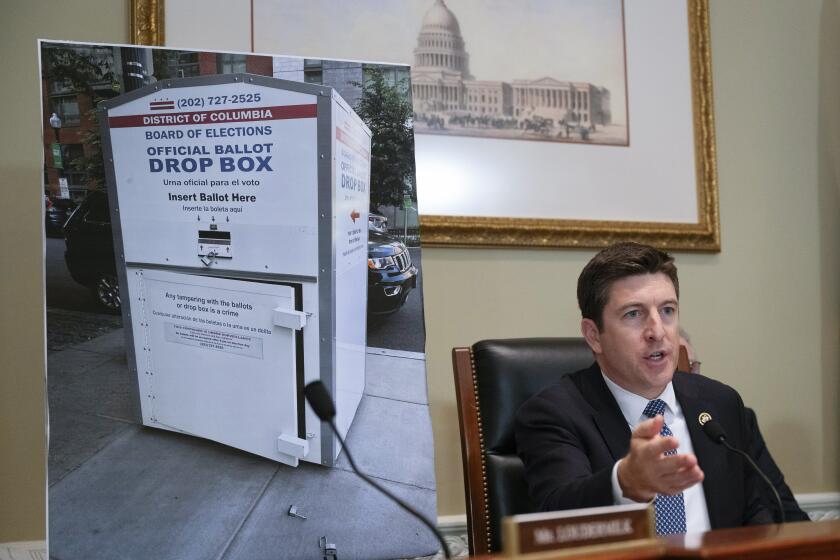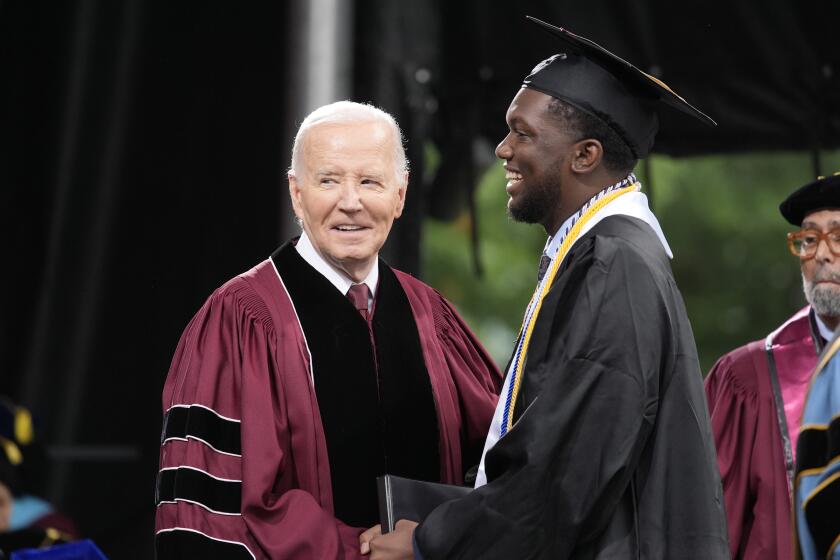Dingell Holds Off Stiff Challenge to Win Democratic Race
Averting an embarrassing defeat for a legendary power broker in Congress, Rep. John D. Dingell (D-Mich.) Tuesday beat back a surprisingly strong challenge from another, much younger House incumbent.
Dingell, the longest-serving member of the House, triumphed in Michigan’s Democratic primary over Rep. Lynn N. Rivers, a four-term House member who was thrown into a face-off with the veteran congressman when the GOP-led state Legislature redrew House district lines after the 2000 census.
Within hours after the polls closed and with Dingell leading, 62% to 38%, Rivers conceded defeat. “The fight for gun safety, the fight for the right to choose and the fight for the environment is not done, and I’ll be back,” Rivers said.
The contest between Dingell and Rivers offered a stark contrast of style and generation to voters in the newly drawn House district, which stretches from the blue-collar outskirts of Detroit that were the core of Dingell’s support to Ann Arbor, the more liberal university town that was the heart of Rivers’ domain.
“She did make us work, I want to say,” Dingell said Tuesday night. “The primary this year was extremely difficult.”
Dingell, 76, campaigned on the long record of major legislation he has helped to enact in his 47 years in the House--both as longtime chairman of the powerful Commerce Committee and as a leading member of the opposition after Republicans took control of Congress in 1995. Rivers, 45, described herself as someone in touch with the concerns of ordinary voters, citing her hard-knocks-life story as a teenage mother married to an auto worker and struggling to make ends meet.
That made the race a test, in part, of how much voters would value seniority and legislative experience over a fresh voice from outside the political establishment who was more focused on liberal social causes.
Both candidates have liberal voting records on most issues. But there were significant national issues at stake in their differences, and the race drew tremendous interest and money from political activists around the country. Dingell’s triumph was a victory for the auto industry, which is central to his district, and gun owners--causes that are often eschewed by Democrats.
Rivers, more liberal on gun-control and environment issues, is also a more consistent abortion rights backer. That helped earn her the strong and well-financed support of women’s political groups that feared the defeat of one of the still-small pool of women in Congress.
The winner of the Democratic primary is considered a shoo-in to win the general election because the party has an overwhelming advantage in the district.
Ed Sarpolus, a Michigan-based pollster, said that Rivers’ campaign drew strength from women and from voters who may have valued Dingell’s seniority but believed it was time for a change. He has served in the House since 1955, when he won a special election upon the death of his father, who had held the seat since 1933.
But the push for change and a bigger voice for women was not enough to overpower Dingell’s advantages in power, campaign contributions and legislative clout. Over the course of his career, Dingell established himself as one of the House’s premier power brokers; even when Congress was under GOP control, he helped craft major bills affecting health, telecommunication policy and gun rights. Meanwhile, Michigan’s attorney general easily beat two veteran politicians for the Democratic nomination for governor in one of the party’s toughest battlegrounds in this year’s primary season.
Canadian-born Jennifer Granholm easily beat Rep. David E. Bonior and former Gov. James Blanchard. Granholm, a relative political newcomer in only her second race, will face Lt. Gov. Dick Posthumus in the November election. He easily beat State Sen. Joe Schwarz for the Republican nomination for governor. Republican Gov. John Engler was unable to run again because of term limits.
Michigan was one of three states holding primaries Tuesday. In Missouri, U.S. Sen. Jean Carnahan easily won the Democratic primary. She was appointed to fill her husband Mel Carnahan’s seat after he died in a plane crash in October 2000, shortly before the election. It was too late for his name to be taken off the ballot and Mel Carnahan defeated Sen. John Ashcroft, now the U.S. attorney general, for the Senate seat. Jean Carnahan will face former Rep. Jim Talent in November.
In Kansas, U.S. Sen. Pat Roberts won the Republican primary in an easy matchup with Tom Oyler, a retired Boeing engineer and farmer.
In the race for Kansas governor, state Treasurer Tim Shallenburger defeated two other Republicans in the contest to succeed Gov. Bill Graves, who is stepping down after eight years because of term limits. Shallenburger’s two opponents, Wichita Mayor Bob Knight and state Senate President Dave Kerr, conceded late Tuesday night.
The Republican winner now faces Democrat Kathleen Sebelius, the state’s popular insurance commissioner, who is the daughter of former Ohio Gov. John Gilligan.
More to Read
Get the L.A. Times Politics newsletter
Deeply reported insights into legislation, politics and policy from Sacramento, Washington and beyond. In your inbox three times per week.
You may occasionally receive promotional content from the Los Angeles Times.







